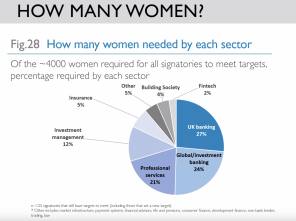

Speaking to FTAdviser, a spokesman said the company paid "careful attention to demographics in offering out any training and we open up reskilling to all applications to ensure we are fully inclusive, rather than just nominating people", and would continue to monitor this carefully.
As research from McKinsey's Future of Women at Work survey suggests, technology has played a pivotal role in changing the way in which certain jobs are carried out.
The result of this, according to consultancy McKinsey, is that 40m to 160m women globally will need to transition between occupations by 2030, often to higher-skilled roles, otherwise they will face a growing wage gap or, worse, displacement by automation.
However, research carried out by Oxford University and Zurich over the past few years has highlighted that people - both male and female - who are most at risk of their jobs being affected by technology were also the least likely to take action.
The spokesperson said: "We know that globally women are in more of the roles likely to be affected by technology. Looking more broadly, the good news is there are also upsides, as technology is enabling more opportunities for women through flexible working."
He pointed to studies which show women spend more time than men on unpaid care work - approximately 1.1trn hours vs 400bn for men globally, which indicates a need for more flexible working patterns put in place for women.
Zurich's comments came as the company pledged to future-proof, re-skill and retrain its workforce - 3,000 jobs in the UK - over the next five years.
The company has already invested almost £1m to upskill existing employees and has created an Automation Academy, which has supported the formation of a 40 strong AI team, all of whom have been retrained internally from across the business.
Each retrained team member has received an average pay increase of 10 per cent in their first year alone.
According to Zurich, upskilling home-grown talent could save the business £1m in recruitment and redundancy costs, and by training one's existing workforce, companies can grow their own top-class talent.
John Keppel, chief operating office at Zurich UK, said: "The skill set of our workforce is constantly changing. As an industry, we battle for top market talent to try and fill that gap. At Zurich, we don’t believe it has to be this way. Whilst we can’t ignore the benefits that automation brings, it’s important to retain, nurture and educate our teams.
"This is a clear opportunity, not a threat to our employees. It’s crucial that we factor the future skills requirements for the business into the process now. If we know what’s coming, we can start transitioning existing employees into new careers today."
In October, FTAdviser reported that Zurich was one of the companies to sign up to a new initiative called #10000blackinterns. This campaign has been backed by major City firms, the Association of British Insurers and former prime minister David Cameron.
It hopes to provide 10,000 paid, meaningful opportunities to young, university-educated black people across a range of sectors.
The overall initiative is led by Dawid Konotey-Ahulu, co-founder of financial consultancy Redington; Jonathan Sorrell, president of Capstone Investment Advisers; Michael Barrington-Hibbert, founder of Barrington Hibbert Associates; and Wol Kolade, managing partner of Livingbridge.
simoney.kyriakou@ft.com



